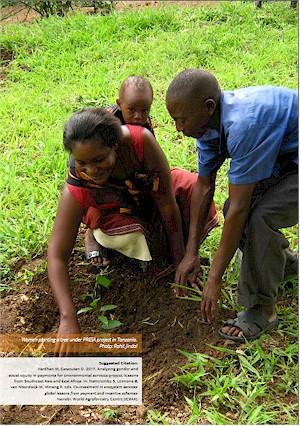| Book Chapter |
 |
|
| Title | Analyzing gender and social equity in payments for environmental services projects: lessons from Southeast Asia and East Africa | | Author | Mamta Vardhan and Delia Catacutan | | Editors | Sara Namirembe, Beria Leimona, Meine van Noordwijk and Peter Akong Minang | | Year | 2017 | | Book Title | Co-investment in ecosystem services: global lessons from payment and incentive schemes | | Pages | 1-14 | | Call Number | BC00442-17 |
|
| Abstract: |
Payments for Ecosystem Services (PES) have attracted increasing interest as a mechanism to conserve landscapes. The dominant theory behind PES assumes that ecosystem services are undersupplied because of market failures and therefore valuing and paying for these services to land stewards will help ensure landscape conservation and provision of ecosystem services. By directly linking payments with opportunity costs of conservation, PES is claimed to be more economically efficient and environmentally effective than previous regulatory approaches to conservation. It is also argued that PES can also help alleviate land-holder poverty. The potential for these win-win options has made PES programs attractive as efficient conservation policy tools. This vision is evidenced in the growing number of PES programs around the globe. For instance, the United Nations’ Reducing Emissions from Deforestation and Forest Degradation (REDD+) program has proposed to channel millions of dollars through a PES approach for forest conservation in the tropics.
At the same time, the efficiency framing within PES has come under critique as it overshadows social, political and institutional dimensions of landscape conservation—most notably social and gender equity. Distribution concerns become important in context of developing countries where PES is framed as part of broader rural development interventions that target socially vulnerable groups. Further, social equity considerations are important in PES-based conservation as there are instrumental links between equity and ecological outcomes, as poor upland farmers in rural areas of developing countries perform stewardship functions in the landscape that are crucial for ecosystem service provision. |
|
|
Download file(s): Click icon to download/open file.
|
| |
File Size |
Description |

|
1804 KB |
Softcopy |
|
|
|
| Viewed in 263 times. Downloaded in 195 times. |